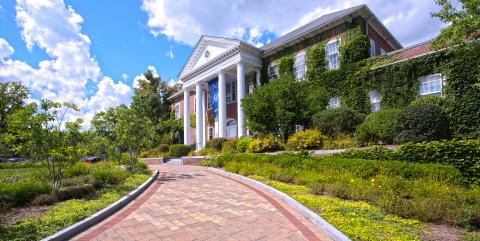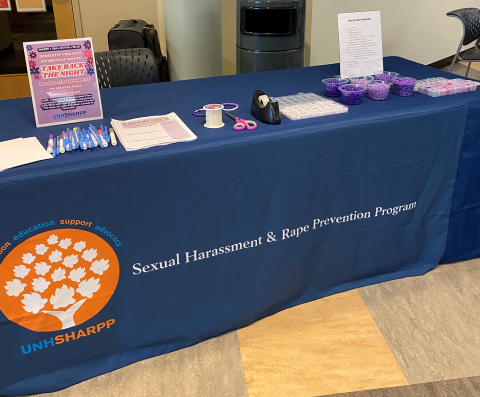
The SHARPP Center’s mission is to provide free & confidential response services and comprehensive prevention initiatives for students, staff, and faculty at the University of New Hampshire. Along with our community, we co-create education, prevention, and advocacy opportunities from an intersectional and empowerment-based lens that recognizes oppression as the root of violence. By centering those most impacted by interpersonal violence, we strive to foster individual healing and collective liberation.
The SHARPP Center for Interpersonal Violence Awareness, Prevention, and Advocacy has existed on UNH Durham’s campus for over 35 years, and with the hiring of The SHARPP Center’s Expanded Services Coordinator, Caroline Young, in November 2022, The SHARPP Center is now an available resource for the UNH Law community. Read below to learn more about SHARPP’s services, prevention programming, and outreach initiatives specific to the UNH Law community.
Our services are available to individuals who have directly experienced interpersonal violence as well as the family, friends, and loved ones who are supporting them. The SHARPP Center strives to provide culturally responsive services to individuals of all identities including gender identity/expression, sexual orientation, race, ethnicity, religion, ability status, and age. We know that interpersonal violence can impact people differently based on identity and strive to operate from intersectional, power-conscious, and empowerment-based frameworks to ensure that our services are holistically supporting individuals wherever they are. Find more general information about our services, who The SHARPP Center serves, and how The SHARPP Center can help here; and click through the tabs below to learn more about The SHARPP Center’s services specifically for the UNH Law community.
Advocates are confidential The SHARPP Center staff and volunteers who meet with survivors to provide a wide range of services. Caroline Young, Expanded Services Coordinator, is the person who members of the UNH Law community would most likely be meeting with, unless they call The SHARPP Center's helpline during evenings or weekends. All advocates have completed a minimum of 30 hours of training on interpersonal violence and the systems survivors may encounter. Advocates aim to assist survivors by providing information, tools, resources, and opportunities. They are trained to work with survivors respectfully, recognizing that systems may be confusing and overwhelming and that some may be more vulnerable to certain systems than others.
Sexual assault, relationship abuse, stalking, and sexual harassment can happen to anyone regardless of identity. We know that at UNH Law, we have communities with unique needs who may deal with a number of issues that others have not experienced. The SHARPP Center recognizes these differences and is committed to serving all UNH Law community members by providing accessible, free, social justice-informed, and confidential services to all survivors and their allies.
Advocates can help identify options and help individuals explore which choices best meet their specific needs in a non-judgmental way. Survivors are encouraged to make decisions about what is best for them, and are not required to take any options provided by the advocate.
A crisis is a time in which someone may feel overwhelmed as a result of the circumstances they are in or a challenging emotional experience. This can be common for individuals who have experienced interpersonal violence. Crises may happen in the moments, hours, and days after violence occurs, and can happen repeatedly throughout someone's life due to various factors, such as memories of their experience being reactivated.
The SHARPP Center's advocates can support survivors in times of crisis by aiming to help them regain a sense of control and balance. In these moments an advocate can provide space to sort through feelings, thoughts, and emotions, as well as helping to identify or strengthen coping skills and discuss options.
Through the 24-hour support line, office and virtual visits, and text/online chat services, The SHARPP Center strives to provide support whenever a survivor needs it (see below for contact details).
Experiencing interpersonal violence can impact someone's feelings of emotional and physical safety. The SHARPP Center's advocates can help survivors identify what would help them feel safer, and to connect to resources to help make these happen. Advocates approach safety planning as an individualized conversation to address the unique safety needs of each individual. Safety planning is a process of exploring possible choices and outcomes and supporting the survivor to develop the plan that feels safest for them. Safety planning may look like exploring current housing arrangements, class or work schedules, support available from family, friends or partners, and resources available in the community. The SHARPP Center views safety planning as an integral part of all of the services we offer rather than a distinct service, which means that as advocates provide advocacy and support in other areas, they will often talk about how those options may impact an individual survivor's feelings of safety.
Additional Safety Planning Resources:
- SPARC (Stalking Prevention, Awareness, and Resource Center) Stalking Safety Strategies
- Safety Planning around Technology
- SPARC Documentation Logs
- Stalking and Harassment Self-Assessment Tool
- Interactive Safety Planning Tool
- Safety & Prevention as a Bystander
If you would like to explore these options, discuss your self-assessment results, or review any safety planning questions with an advocate from The SHARPP Center, book a confidential appointment with Caroline Young, Expanded Services Coordinator.
For UNH Law students, faculty, and staff who have experienced violence perpetrated by another UNH community member, The SHARPP Center's advocates can help make sense of and pursue options through the University. This may include connecting them with the Civil Rights and Equity Office (CREO) to request supportive measures such as academic accommodations or to pursue a formal university process. The SHARPP Center's advocates can provide information about what these processes may look like and can accompany a survivor to meetings, interviews, and hearings.
Additionally, surviving a traumatic event like sexual or relationship violence can impact many aspects of our lives, including academic success.
The SHARPP Center may be able to provide assistance if a survivor finds they are having trouble keeping up with coursework, studying for tests, or completing assignments on time. The SHARPP Center can coordinate with CREO to request a Dean’s Letter. This is a general letter that communicates a student is experiencing challenging circumstances, without identifying what happened. Through the letters, professors will be asked to give consideration to students in their coursework, though it is important to know that this does not serve to excuse absences or late/missing assignments. The purpose of the letter is to facilitate recovery of the student survivor with minimal impact on their academic achievement. After the letters have been sent, students are encouraged to work directly with their professors to address their individual needs.
While every survivor’s story is different, there are many resources throughout the UNH Law and local communities that can aid in an individual's healing process. The SHARPP Center’s focus on interpersonal violence provides the community with advocates who are aware of the many resources available to survivors that someone may want to utilize. Advocates can help connect someone to the resources they need, but may not already be aware of, including Crisis Center of Central New Hampshire, or CCCNH, (Merrimack County) or other crisis centers and resources that are local to where survivors live, work, etc.
To find other resources in your state or area:
- NHCADSV (New Hampshire Coalition Against Domestic and Sexual Violence) - to find your NH county's crisis center
- SPARC (Stalking Prevention, Awareness, & Resource Center)
- National Domestic Violence Hotline
- NSVRC (National Sexual Violence Resource Center)
- RAINN (Rape, Abuse & Incest National Network)
- Use this tool to find your local crisis center outside of NH
Outreach
Outreach is the work that we do to ensure all UNH Law community members know who The SHARPP Center is and what our services are. Want to get to know The SHARPP Center's Expanded Services Coordinator, Caroline Young? Want to invite Caroline to your next student org meeting or class for a 20-30 minute presentation on The SHARPP Center's services at Law? Email Caroline to grab a coffee/tea with Caroline or book a "SHARPP at Law" presentation (in-person or virtual)!
Prevention Programming
In addition to The SHARPP Center's direct services and outreach, The SHARPP Center is now offering prevention programming for UNH Law. Read more about The SHARPP Center's vision for a UNH free from violence and the importance of prevention programming here. Caroline Young, Expanded Services Coordinator, has designed 3 different programs specifically for UNH Law:
Smooth Sailing: Navigating Relationships through Societal Norms
50-60 minutes | In person or virtual
An interactive presentation & activity on how cultural norms influence relationship dynamics
The Bystander Chronicles
80-90 minutes | In person only
A presentation & role-playing game exploring bystander intervention
Trauma-Informed Lawyering
120 minutes | In person only
A interactive presentation on principles of trauma-informed care and trauma-informed lawyering with a scenario activity encouraging participants to apply their knowledge to real-life cases
To request one of these programs, or one of our other programs, for your student organization, classroom, or department please fill out our Program Request Form.
Awareness Campaigns

The SHARPP Center honors three awareness months each academic year that help increase community knowledge and connection to our work.
Relationship Abuse Awareness Month/Domestic Violence Awareness Month (October)
National Stalking Awareness Month (January)
Sexual Assault Awareness Month (April)
Learn more about the history of these awareness initiatives!
Volunteer Information
At this point in time, there are a few ways to get involved with The SHARPP Center on the UNH Law campus if you are interested in the work that we do.
Students can:
- Help The SHARPP Center with tabling (set up, activity, break down)
- Help The SHARPP Center plan an event or program (ideas, collaboration, etc.)
- Help The SHARPP Center during events (set up, break down, etc.)
If you are interested in planning an event with The SHARPP Center:
- Email Caroline Young to set up a planning meeting to discuss your event idea and budget, confirm a date, time, and location, and divide up tasks at least 4 weeks before your planned event date
- Continue having regular planning meetings with Caroline to prepare advertising, food (if applicable), booking a space (if in person), and determine duties during the event
- Event ideas can include: "The SHARPP Center" Expo, Open-Mic Night, Take Back the Night, Film Screenings, and more!
Reach out to Caroline Young, Expanded Services Coordinator, if interested in learning more.
Contact

She, Her(s)
To meet with Caroline:
Drop in hours @ Law: Thursdays 9AM-4PM in RM 313
Schedule a confidential virtual meeting
Book a prevention program
Email: Caroline.Young1@unh.edu
